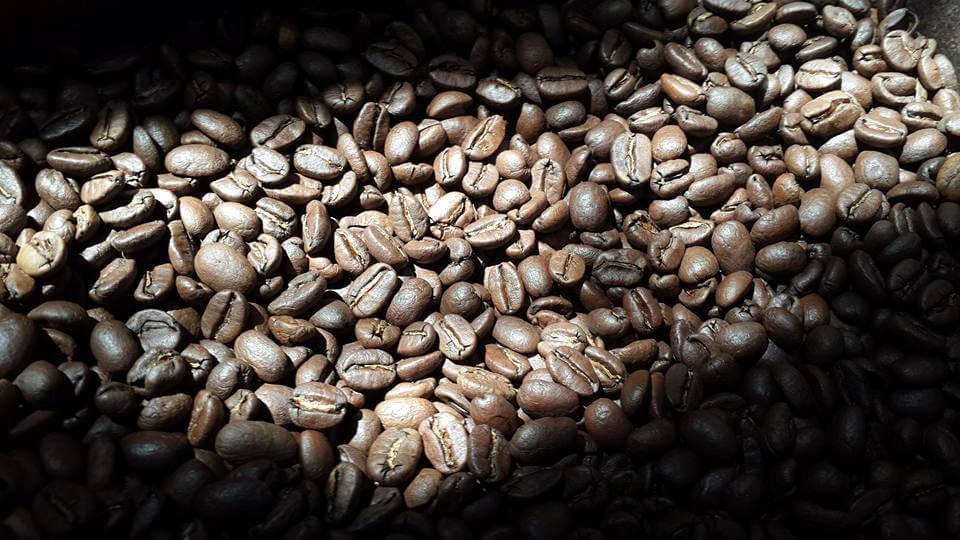
Our Blog
August Roastmaster's Select: Santa Maria de Dota
View BY :
Roastmaster's Select Club: Coffee from Costa Rica
Each month, our Roastmaster, Jacob Long, hand-picks fresh and unique micro lot coffees that we deliver straight to your doorstep. “What is a micro lot,” you ask? Read up on how we source the beans and what happens when they reach our roastery.
Jacob’s selection this month is an eco-friendly coffee grown in Costa Rica.
Join the Roastmaster’s Select Club to begin your coffee journey around the world.
Coffee Grown in Costa Rica
This month's coffee selection from our Roastmaster, Jacob Long, is not only delicious and awakening, it's also environmentally-friendly - which is very important to us. Our Costa Rican Santa Maria de Dota is grown by the Cooperativa de Caficultores de Dota R.L. (CoopeDota), established in 1960 and made up of over 900 farmers in the San José region.
To emphasize their environmentally-conscious farming techniques, CoopeDota is one of the first to utilize a certified carbon-neutral mill with hydro-powered energy consumption, water efficient eco-pulpers and mechanical coffee dryers fueled by coffee parchment. If all of that wasn't impressive enough, CoopeDota also provides trash pickup for the entirity of San Jose, furthering their committment to a healthy environment and bettering of the planet.
We're so thrilled to share this coffee with you! Remember to leave us a review and add a photo to earn more beans, for more discounts!
Altitude: 1550 – 1950 meters
Processing: Eco-pulped and dried inthe sun and mechanical driers
Region: Dota, San José, Costa Rica
Varietal: Catuai, Caturra
Image from Cafe Dota's Facebook Page
Recommended Reading
Back to the Blog-
![The History of Our Holiday Blend]()
A Tradition That’s Been Brewing Since 1980
Every holiday season, the air around our Mendocino roastery has filled with the rich aroma of something special: the first roast of our Holiday Blend.
Born from the coastal fog and festive spirit of Northern California, this blend has become one of our longest-running traditions, crafted each year as a toast to connection, craftsmanship, and gratitude.
Now in its forty-fourth season, Holiday Blend continues to honor its original intent: to bring people together around a cup that complements the flavors of the season and celebrates the people who grow it.
How a Seasonal Tradition Began
We have recreated this medium roast blend every year since 1980, always sourcing from the same three origins—Nicaragua, Colombia, and Sumatra.
While the components remain constant, no two years are ever exactly alike. Climate, weather patterns, and even volcanic activity shape the harvests, creating subtle shifts in flavor and aroma.
Yet through all those changes, one thing remains true: every Holiday Blend is designed to be the perfect companion to the decadent foods and sweet gatherings of the season.
Flavor Notes: Comfort, Depth & Velvet Finish
Dark chocolate greets you at first sip, followed by a gentle hint of cedar and a finishing sparkle of ripe plum.
This medium roast invites warmth on cool mornings and pairs beautifully with rich, traditional holiday fare—from spiced cakes and roasted nuts to your favorite desserts.
“Great coffee begins with gratitude - for farmers, for land, and for the craft that brings it all to life. The Holiday Blend is our yearly toast to that gratitude.”
Where It's Grown
- Colombia — Deep dark chocolate and smooth sweetness from Finca Agroberlin in the snow-peaked mountains of the Sierra Nevada de Santa Marta
- Sumatra — Earthy, cedar-like depth from the Gayo Mountains’ dense tropical forests.
- Nicaragua — Bright, lively notes from Jinotega, the heartland of coffee country—bringing balance to every cup
Together, they compose a coffee that’s both grounded and celebratory—finishing with a ripe plum sparkle and a long finish that lingers like a favorite holiday memory.
How To Brew, Pair & Share
Brewing Methods: French press for round body; pour-over or auto-drip for clarity and cocoa-cedar sweetness.
Pairings: Spiced persimmon cake, cranberry-orange loaf, or dark-chocolate sea-salt bark.
Gifting: Tuck a bag with a handwritten note and your favorite brewing tip—instant host gift.
Recipe idea: Try a simple Holiday Mocha—6 oz Holiday Blend + 1 oz dark chocolate syrup + steamed milk; dust with cinnamon and orange zest.
Persimmon Spice Cake is great with Holiday Blend
A Cup Worth Gathering Around
The Holiday Blend reflects who we are as a company: devoted to the art of roasting, committed to our farmer partners, and guided by gratitude for the land that sustains us.
It’s a seasonal reminder that great coffee is more than just flavor—it’s a story of resilience, relationship, and care.
Every bag carries forward our promise: Not Just a Cup, But a Just Cup.™
Bring the Tradition Home
Make this season’s gatherings a little warmer—with a cup that celebrates people and planet.
From the RoasteryThe History of Our Holiday Blend
read more -
![Simplifying to Serve You Better: A New Chapter in Our Coffee Journey]()
Simplifying to Serve You
The coffee landscape is dramatically different than it was when we began this journey 53 years ago.
In those early days, we built our lineup coffee by coffee — adding blends and single origins as new beans became available and relationships grew. For decades, harvests were plentiful and sourcing was straightforward.
Today, the world of coffee is evolving. Climate shifts, supply chain realities, and changing customer preferences mean we need to be as thoughtful and resourceful as possible to keep doing what we do best: bringing you exceptional coffee with integrity.
Change for the Better
We're streamlining our packaged coffee offerings, starting in September. With a simplified lineup of coffees, we'll focus on the blends and origins we can source consistently, roast with excellence, and deliver to you at the highest possible quality.
By simplifying our offerings, we will:
- Deepen our support for the farmers we work with through more focused purchasing.
- Maintain freshness and quality in every cup we roast.
- Stay nimble in a changing coffee landscape, so we can continue being your favorite coffee company for years to come.
What This Means For You
We know change isn’t always easy — especially when it means saying goodbye to a favorite. But change also creates space for something new.
- Nearly every retiring coffee has a suggested alternative: matched for flavor, roast level, and story.
- All coffees will remain listed on our website, so you can easily find info about alternatives or select a bulk purchase option.
- Cause Coffees: For special details on replacements and recommendations, visit our Cause Coffee page.
- Bulk options: Many coffees will still be available in 5 lb bags, even if they’re not sold in retail-size packaging. We’re happy to share our best practices for keeping coffee fresh in larger quantities.
Find Your Next Favorite Cup
We know you might be wondering, “What will replace my favorite?”
Here’s the list of our retiring coffees with the roasts we recommend in their place — each one carefully matched for flavor, roast, and story.
- ⏳ Albion River Inn Blend → Try Paul’s Blend
- ⏳ Beaujolais Blend → Try Old Town French
- ⏳ Costa Rica → Try Peru
- ⏳ Delicious Peace Dark → Try Mendocino Vienna
- ⏳Delicious Peace Medium → Try Rwanda
- ⏳ Guatemala → Try Song Bird Guatemalan
- ⏳ Hazelnut → Available in 5lb bag
- ⏳ MacCallum House Blend → Try Beaujolais FTO
- ⏳ Mocha Java FTO → Try Mocha Java Classic
- ⏳ Nicaragua → Try Song Bird Nicaragua
- ⏳ Vienna → Try Mendocino Vienna
- ⏳For Cause Coffees →See Cause Coffee Guide
Our Commitment Remains the Same
For over five decades, we’ve been devoted to ethically sourced, artisan roasted coffee — and that will never change. Every decision we make is rooted in our mission:
- Source with integrity
- Roast with care
- Honor the stories behind every coffee bean
Thank you for growing with us, embracing new favorites, and sharing our belief that coffee is more than a drink. It's a daily connection to people, to our planet, and our sense of purpose.
With gratitude since 1972,
The Thanksgiving Coffee Team
You might be interested in...
Sold outSold outSold out
Lavender Grace is the sustainability consultant for Thanksgiving Coffee Company
From the RoasterySimplifying to Serve You Better: A New Chapter in Our Coffee Journey
read more

A Tradition That’s Been Brewing Since 1980
Every holiday season, the air around our Mendocino roastery has filled with the rich aroma of something special: the first roast of our Holiday Blend.
Born from the coastal fog and festive spirit of Northern California, this blend has become one of our longest-running traditions, crafted each year as a toast to connection, craftsmanship, and gratitude.
Now in its forty-fourth season, Holiday Blend continues to honor its original intent: to bring people together around a cup that complements the flavors of the season and celebrates the people who grow it.
How a Seasonal Tradition Began
We have recreated this medium roast blend every year since 1980, always sourcing from the same three origins—Nicaragua, Colombia, and Sumatra.
While the components remain constant, no two years are ever exactly alike. Climate, weather patterns, and even volcanic activity shape the harvests, creating subtle shifts in flavor and aroma.
Yet through all those changes, one thing remains true: every Holiday Blend is designed to be the perfect companion to the decadent foods and sweet gatherings of the season.
Flavor Notes: Comfort, Depth & Velvet Finish
Dark chocolate greets you at first sip, followed by a gentle hint of cedar and a finishing sparkle of ripe plum.
This medium roast invites warmth on cool mornings and pairs beautifully with rich, traditional holiday fare—from spiced cakes and roasted nuts to your favorite desserts.
“Great coffee begins with gratitude - for farmers, for land, and for the craft that brings it all to life. The Holiday Blend is our yearly toast to that gratitude.”
Where It's Grown
- Colombia — Deep dark chocolate and smooth sweetness from Finca Agroberlin in the snow-peaked mountains of the Sierra Nevada de Santa Marta
- Sumatra — Earthy, cedar-like depth from the Gayo Mountains’ dense tropical forests.
- Nicaragua — Bright, lively notes from Jinotega, the heartland of coffee country—bringing balance to every cup
Together, they compose a coffee that’s both grounded and celebratory—finishing with a ripe plum sparkle and a long finish that lingers like a favorite holiday memory.
How To Brew, Pair & Share
Brewing Methods: French press for round body; pour-over or auto-drip for clarity and cocoa-cedar sweetness.
Pairings: Spiced persimmon cake, cranberry-orange loaf, or dark-chocolate sea-salt bark.
Gifting: Tuck a bag with a handwritten note and your favorite brewing tip—instant host gift.
Recipe idea: Try a simple Holiday Mocha—6 oz Holiday Blend + 1 oz dark chocolate syrup + steamed milk; dust with cinnamon and orange zest.
Persimmon Spice Cake is great with Holiday Blend
A Cup Worth Gathering Around
The Holiday Blend reflects who we are as a company: devoted to the art of roasting, committed to our farmer partners, and guided by gratitude for the land that sustains us.
It’s a seasonal reminder that great coffee is more than just flavor—it’s a story of resilience, relationship, and care.
Every bag carries forward our promise: Not Just a Cup, But a Just Cup.™
Bring the Tradition Home
Make this season’s gatherings a little warmer—with a cup that celebrates people and planet.
The History of Our Holiday Blend
read more
Simplifying to Serve You
The coffee landscape is dramatically different than it was when we began this journey 53 years ago.
In those early days, we built our lineup coffee by coffee — adding blends and single origins as new beans became available and relationships grew. For decades, harvests were plentiful and sourcing was straightforward.
Today, the world of coffee is evolving. Climate shifts, supply chain realities, and changing customer preferences mean we need to be as thoughtful and resourceful as possible to keep doing what we do best: bringing you exceptional coffee with integrity.
Change for the Better
We're streamlining our packaged coffee offerings, starting in September. With a simplified lineup of coffees, we'll focus on the blends and origins we can source consistently, roast with excellence, and deliver to you at the highest possible quality.
By simplifying our offerings, we will:
- Deepen our support for the farmers we work with through more focused purchasing.
- Maintain freshness and quality in every cup we roast.
- Stay nimble in a changing coffee landscape, so we can continue being your favorite coffee company for years to come.
What This Means For You
We know change isn’t always easy — especially when it means saying goodbye to a favorite. But change also creates space for something new.
- Nearly every retiring coffee has a suggested alternative: matched for flavor, roast level, and story.
- All coffees will remain listed on our website, so you can easily find info about alternatives or select a bulk purchase option.
- Cause Coffees: For special details on replacements and recommendations, visit our Cause Coffee page.
- Bulk options: Many coffees will still be available in 5 lb bags, even if they’re not sold in retail-size packaging. We’re happy to share our best practices for keeping coffee fresh in larger quantities.
Find Your Next Favorite Cup
We know you might be wondering, “What will replace my favorite?”
Here’s the list of our retiring coffees with the roasts we recommend in their place — each one carefully matched for flavor, roast, and story.
- ⏳ Albion River Inn Blend → Try Paul’s Blend
- ⏳ Beaujolais Blend → Try Old Town French
- ⏳ Costa Rica → Try Peru
- ⏳ Delicious Peace Dark → Try Mendocino Vienna
- ⏳Delicious Peace Medium → Try Rwanda
- ⏳ Guatemala → Try Song Bird Guatemalan
- ⏳ Hazelnut → Available in 5lb bag
- ⏳ MacCallum House Blend → Try Beaujolais FTO
- ⏳ Mocha Java FTO → Try Mocha Java Classic
- ⏳ Nicaragua → Try Song Bird Nicaragua
- ⏳ Vienna → Try Mendocino Vienna
- ⏳For Cause Coffees →See Cause Coffee Guide

Our Commitment Remains the Same
For over five decades, we’ve been devoted to ethically sourced, artisan roasted coffee — and that will never change. Every decision we make is rooted in our mission:
- Source with integrity
- Roast with care
- Honor the stories behind every coffee bean
Thank you for growing with us, embracing new favorites, and sharing our belief that coffee is more than a drink. It's a daily connection to people, to our planet, and our sense of purpose.
With gratitude since 1972,
The Thanksgiving Coffee Team
You might be interested in...
Lavender Grace is the sustainability consultant for Thanksgiving Coffee Company
Simplifying to Serve You Better: A New Chapter in Our Coffee Journey
read more
Ethically Sourced, Artisan Roasted:
Crafting exceptional coffee experiences since 1972 through sustainable partnerships and masterful roasting
For over 50 years, we've pioneered sustainable coffee sourcing while perfecting the art of small-batch roasting. Every bean tells a story of environmental stewardship, farmer empowerment, and uncompromising quality.
Global Partners
From Nicaragua's misty mountains to Rwanda's vibrant highlands, our decades-long partnerships with farming communities ensure exceptional coffee while promoting sustainable practices.
Environmental Leadership
From pioneering shade-grown certification to planting over 82,800 trees, our commitment to environmental stewardship sets industry standards.
Artisan Roasting
Each small batch is carefully roasted to perfection, bringing out the unique character of every origin while ensuring consistent, exceptional quality.
Farmer Empowerment
Through innovative programs like our cupping labs and Farmers Thriving Index, we ensure our partners thrive while producing exceptional coffee.
Recognition for Excellence
Honoring Exceptional Craft: A Lifetime of Roasting Mastery
Roaster of the year
good food awards
Honors Superior Taste with Commitment to Social and Environmental Justice
+ Multiple 90+ Reviews
Our Partner Network
Our multi-generational partnerships with farm communities stretch back decades, cultivating relationships as carefully as we roast our award-winning coffee beans
Corrales Family
25+ years of partnership in sustainable coffee cultivation and community development
- THIRD-GENERATION FAMILY RELATIONSHIP - LEADERS IN SHADE-GROWN CULTIVATION - CERTIFIED BIODYNAMIC AND ORGANIC PRACTICES - PIONEERS IN REGENERATIVE FARMING
CECOCAFEN
25+ years of partnership in sustainable coffee cultivation and community development
- CUPPING LAB PROJECT PIONEERS - COMMUNITY-DRIVEN COOPERATIVE - MULTI-GENERATIONAL FARMING EXPERTISE
Guaya'b Cooperative
25+ years of partnership in sustainable coffee cultivation and community development
- CERTIFIED BIRD FRIENDLY HABITAT - ORGANIC CERTIFICATION - SMALL FAMILY FARM COOPERATIVE MODEL - CHAMPIONS OF BIODIVERSITY
Experience Our Legacy
Join us in our mission to create exceptional coffee while making a positive impact on communities and the environment
Cupping Lab Revolution
Developed the world's first cupping labs owned and operated by small-scale farmers and cooperatives
State-of-the-art cupping lab development in Nicaragua. Global Impact that enabled the development of 3rd and 4th wave artisan coffee techniques.
Environmental Leadership
First to establish industry-wide sustainability standards
Community Innovation
This isn't just about buying beans; it's about nurturing relationships that transform communities.
Our true measure of success is the lasting impact we create in coffee-growing communities around the world.
We are continuing the legacy of exceptional coffee that makes a difference.
Lavender Grace is the Sustainability Consultant for Thanksgiving Coffee Company



